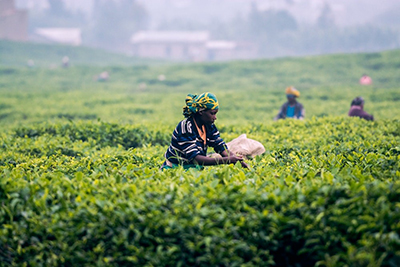Booming demand for food derived from animals has led to unprecedented increases in livestock production over the past few decades. This increase in production and consumption of animal products creates risks for both environmental and human health. Can actuarial science play a role in minimising these negative impacts?
Livestock production has a huge environmental footprint. Reducing the environmental impact of the animal agriculture industry would be one of the most effective ways to tackle climate change and a number of other sustainability issues our world is facing today.
The livestock sector has also been found to be a significant contributor to climate change, with the Food and Agriculture Organisation of the United Nations reporting that the sector was responsible for 18 per cent of human-induced greenhouse gas emissions. This is more than the combined exhaust from all transportation. The sector also has a significant water footprint, with the average water footprint per calorie for beef, being twenty times larger than for cereals and starchy root vegetables.
In addition to the environmental impacts, the consumption of some animal products has been associated with adverse health effects. The World Health Organisation has classified processed meat as a Group 1 carcinogenic to humans. This category is used when there is convincing evidence that the agent causes cancer. Tobacco smoking and asbestos have received the same classification. While there is limited evidence at this stage, red meat, including beef, veal, pork, lamb and goat, was classified as Group 2A - probably carcinogenic to humans. Efforts to reduce animal agriculture, as well as the consumption of food products derived from it, have the potential to improve performance across a whole range of the goals including climate action, zero hunger, good health and wellbeing, clean water and sanitation, responsible consumption and production, life below water and life on land.
There are a number of ways the work of actuaries could help to reduce the negative impacts of animal agriculture. Actuaries providing investment advice could recommend the divestment of funds from organisations involved in animal agriculture. An initial recommendation would be to divest from those organisations who do not follow sustainable principles and practices. Actuarial analysis could identify alternative investment opportunities with expected rates of return that are as good, if not better, to ensure there is no financial detriment. Future investment could be targeted at organisations involved in the production of plant-based food, development of sustainable food sources, or reforestation.
Actuaries working in insurance could also help to address the issue by designing innovative insurance products which alleviate barriers to plant-based food farming. Recently, Resonance Global and Jubilee Insurance partnered together and utilised newly available hyper-accurate climate data to successfully develop a weather-indexed crop-insurance product in Kenya. The accurate, verified, and reliable weather data enabled the partners to evaluate risk and price premiums in a way that is both affordable for the farmers and sustainable from a business perspective. In early 2017, the partners rolled out the new insurance product, called Kinga Kilimo (Protect Your Farm) in 10 counties across Kenya, with plans to roll out to the rest of Kenya in the following year. It is hoped that Jubilee’s affordable, easy-to-access crop insurance product will go some way to eliminating the financial risks to smallholder farmers enabling them to provide for their families and take calculated risks on innovations like improved hybrid seeds or fertilizers that can increase yields and raise incomes.

The insurance industry may also indirectly address the issue by discouraging individuals to eat meat, dairy and other animal products by recognising the health risks they pose. The amount of animal products the policyholder consumers could be considered alongside other rating factors. For example, Health I.Q., an American Insurance provider, offers special rate insurance products for health conscious vegans.
Image: Maxime Niyomwungeri https://unsplash.com/photos/UdhpcfImQ9Y
Food and Agriculture Organization of the United Nations, ‘Animal Agriculture’, http://www.fao.org/animal-production/en/.
Poore, J and Nemecek, T. (2018) ‘Reducing food’s environmental impact through producers and consumers.’ Science 360 (6392), pp 987-992. https://science.sciencemag.org/content/360/6392/987
Food and Agriculture Organization of the United Nations ‘Livestock's Long Shadow: environmental issues and options’, 2006. http://www.fao.org/docrep/010/a0701e/a0701e00.HTM
Mekonnen, Mesfin M. & Hoekstra, Arjen Y. "A Global Assessment of the Water Footprint of Farm Animal Products". Ecosystems (2012) 15: 401-415. http://temp.waterfootprint.org/Reports/Mekonnen-Hoekstra-2012-WaterFootprintFarmAnimalProducts.pdf
World Health Organization, ‘Q&A on the carcinogenicity of the consumption of red meat and processed meat’ 2015. http://www.who.int/features/qa/cancer-red-meat/en/
World Health Organization, ‘Obesity and Overweight,’ 2018. http://www.who.int/en/news-room/fact-sheets/detail/obesity-and-overweight
Food and Agriculture Organization of the United Nations, ‘Tackling Climate Change through Livestock: a Global Assessment of Emissions and Mitigation Opportunities’, 2013. http://www.fao.org/3/a-i3437e.pdf.
Resonance Global, ‘An Insurance Product for Rural Farmers’, 2017. https://resonanceglobal.com/insurance-product-designed-africas-rural-farmers/
Health I.Q., ‘5 reasons why vegans should get a lower rate on life insurance’. https://www.healthiq.com/life-insurance/research-vegan